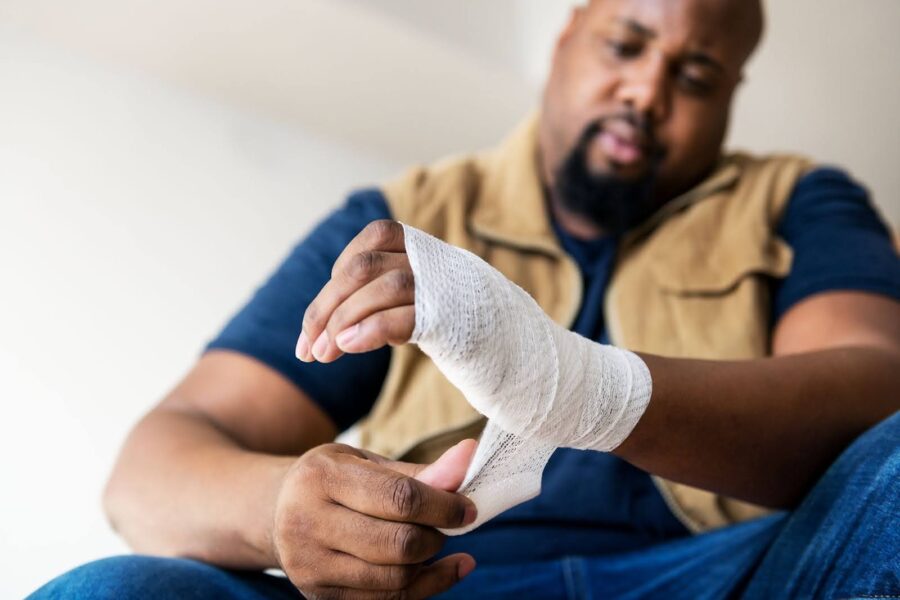Worker’s compensation insurance is a business insurance that protects you from work-related injury. Its purpose is to ensure your employer compensates your medical bills and lost income due to an injury emanating from your job. If you have an injury in the workplace premises or anywhere else while doing your job, the worker’s compensation insurance covers you.
You will file for worker’s compensation if you’re sick or injured due to the nature of your work. But first, you’ll seek medical attention and notify your employer. That’s when you can request a worker’s compensation claim form to fill it out before submitting it. Let’s look at the claims filing process and what you could do if your employer doesn’t compensate your medical expenses and lost wages.
Process for Filing a Compensation Claim
If you get a work injury or have fallen sick due to the nature of your work, you’re eligible for worker’s compensation insurance from your employer. If your injury or illness is severe, you could contract a reputable and experienced law firm like VogelLLP to help you file for compensation. However, the process is straightforward:
Go To the Hospital First
The first thing to do is seek medical care after suffering a work injury. Healthcare providers will look at the extent of the damage and document it. Also, going to the hospital first ensures you’re out of harm’s way to deal with everything else later.
Let your Employer Know your Injury
Once the medical team has cleared you for discharge, you will inform your employer of your injury in writing. Ensure they know the time and date of the injury and how it happened.
Fill out a Worker’s Compensation Claims Form

It’s your employer who will provide you with this form; you’ll fill out personal details and other information. Personal information will include your name, address, social security number, and contact information.
Of course, you’ll also provide employment information: nature of your work and income. The form also has space for detailing the injury and where to provide information on the medical treatment.
Submit the Form to your Employer
You will hand over the compensation claims form to your employer, who will take it to their workers’ compensation insurer. There’s a waiting period for the insurance company to process your medical expenses and lost wages compensation. This period is 3 – 7 days, depending on where you live. Workers’ compensation companies pay out compensations within two weeks after approval.
What Do You Do If the Employer Doesn’t Compensate?

The law mandates your employer to compensate for your injuries resulting from your work. However, some employers might not comply with the work injury compensation law. There are a few things you can do if you’re in this situation.
Take Matters Up with The Workers’ Compensation Agency
First, your employer should provide insurance coverage for work injuries. If they don’t have this insurance, there might be indecision to compensate you. Every state has a workers’ compensation agency where you can report a hesitant employer.
The agency will take legal action against the employer and compel them to offer the same compensation as what you’d receive from an insurance company.
File a Personal Injury Lawsuit
You can also file a personal injury lawsuit against your employer if they fail to compensate for your work injury and medical expenses incurred. When opting for a law firm to handle your personal injury lawsuit, choose a law firm with experience spanning decades.
Also, ensure the firm has leading lawyers in their areas of expertise. Such lawyers will get to the specifics of your injury and how it impacts your quality of life. As a result, you may receive the full amount of the compensation from the employer.
Lawyers will bypass the cap set by workers’ compensation insurance companies. Most insurance companies pay up to two-thirds of your lost wages. But a personal injury lawyer ensures you receive full pay and compensation for other damages.
Visit State-Sponsored Workers’ Insurer

While many employers have insured their employees against work injuries, some have not such insurance coverage. You might be working for an employer with no work injury coverage. If you get a work injury, such an employer might not compensate you for the medical expenses and injuries suffered.
You can receive compensation from state-sponsored compensation companies. The government usually sets aside funds for uninsured employers and their employees. These are the companies to visit if you’re an insured employer.
Talk To a Lawyer
You can also talk to a lawyer if your employer doesn’t compensate for your work injury. A lawyer understands the scope of your injury and can guide you through the process of defending your rights as a worker. What’s more, the lawyer can represent you in compensation hearings if the matter heads to court.
Why The Employer Has to Compensate for Your Injury
First, work injury may cause permanent disability. Your ability to work will forever be non-existent, and you won’t earn a wage as a worker. The employer has to compensate you by providing long-term benefits or a lump-sum amount to help you survive.
Your medical expenses can also take a significant amount from your savings. That will affect your winter days when you need hay made while the sun shines. The employer has to prevent you from spending your savings on medical expenses.
While you’re on sick bed, you can’t earn any wage, yet you have to pay bills. The wages you lose because you’re sick will only make your bills rise through the roof. The employer has to pay for the lost wages to help foot your bills.
Conclusion
Work-related injuries could affect your ability to work and make a decent living. If you’re a victim of work injuries, you can receive compensation from your employer. The law requires employers to insure their employees against work injuries since some work has more hazards.
If an employer hasn’t insured employees, personal injury lawyers can take legal actions against them and compel them to compensate affected employees. Therefore, contracting lawyers from a reputable law firm might help you receive compensation.

